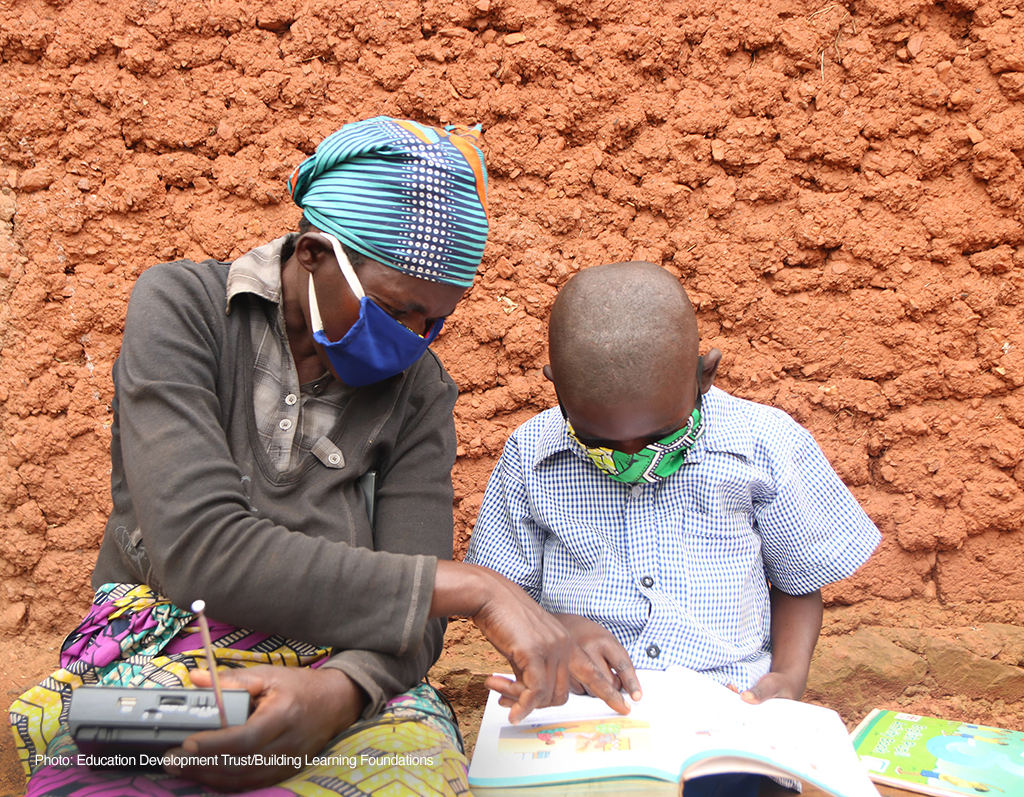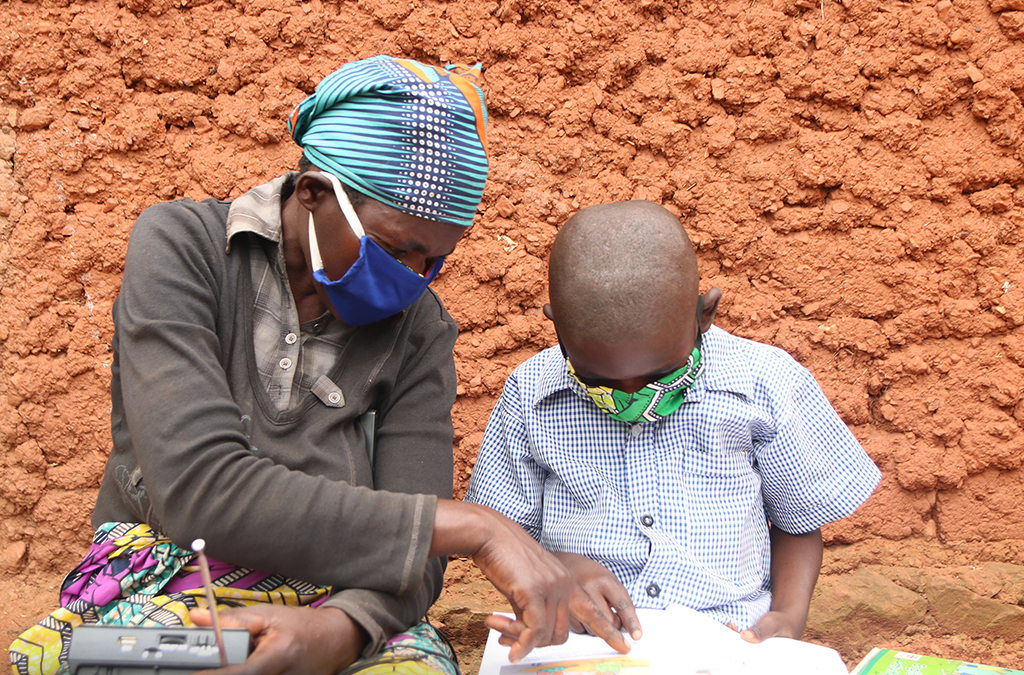
–DOHA/KIGALI/READING/WASHINGTON, DC (September 20, 2021) – During the height of the COVID-19 pandemic in September 2020, the Rwanda Basic Education Board (REB) – in its efforts to improve the country’s school leaders – formed a learning partnership with the Education Commission, Education Development Trust, and WISE to undertake rapid research on school and system leadership during school closures and as they started to reopen for the first time.
The research results from this innovative collaboration – The Rwanda Learning Partnership: Insights on School and System Leadership During COVID-19 – were released today along with an accompanying policy brief, Bridging the Evidence to Policy Gap: A Learning Partnership Approach to Research.
REB’s Head of Teacher Development and Management Leon Mugenzi reflected that this research “helped set the vision for school leadership – the role needs to change, by supporting parents, supporting learners in difficult moments. This project gives us a new orientation and new content to train our school leaders.”
WISE’s Director of Research, Dr. Asmaa Al-Fadala, highlighted the importance of this partnership during a critical time for global education: “This has been a deeply collaborative process and the learning partnership approach has allowed our research to have real-time impact. We are grateful to all our partners – Education Commission, Education Development Trust, and the Rwanda Basic Education Board – who made this important project happen. Conducting research during the COVID-19 pandemic has not been without its challenges, but the crisis context has provided unique insights into many of the leadership competencies and capabilities that are essential now and in the future.”
The learning partnership approach is an iterative process of co-designing the research, data gathering and collective reflection, and collaborative decision-making. The approach identifies “bright spots” to leverage existing solutions for system-wide change. A critical element of this approach is immediate feedback and discussion of findings as they emerge at each stage of the research (surveys, interviews, case study schools) so that responses can be made in real time to create live impact on policy and decision-making. Education Development Trust’s Chief Executive Patrick Brazier comments, “It has been a great pleasure to have worked with our partners to undertake research and generate insights to help the Rwanda Basic Education Board take forward their vision for more resilient school and system leadership. What we have learned about the process has been just as important as what we have learned about leadership – what they both have in common is a fundamental, unfailing commitment to collaboration and an ‘open-to-learning’ mindset.”
Key findings from the learning partnership highlighted three main strategies used by leaders to provide continuity of learning and support during school closures and reopening:
1. Engaging with caregivers, communities, and other sectors
Eighty-three percent of school leaders surveyed said they worked with parents to help provide continuity of learning for students during school closures. Almost all of the leaders surveyed (85%) used engagement with community leaders as the number one way to minimize dropouts.
2. Collaborating with teachers and other school leaders
School leaders relied heavily on one another as a resource – 90% of school leaders surveyed engaged with a school leader organization or network during school closures and 93% did so after reopening, sharing plans to support learners and logistical preparation for school reopening.
3. Tracking, sharing information, and providing targeted support
Some schools mapped the location of the most vulnerable learners during closures, and teachers living in nearby communities provided targeted support, including provision of written materials and sexual and reproductive health support for girls.
Some school leaders shared information with local authorities to facilitate follow-up for learners who did not report to school when they reopened. Some schools created forums for psychosocial support.
The Education Commission’s Director Liesbet Steer added, “The insights and impact on the ground spurred on by this learning partnership have demonstrated not only the potential of this collaborative approach, but the importance of research on the wider education workforce and the critical roles that school and system leaders play in transforming teaching and learning. We are committed to further research and evidence-generation around our Education Workforce Initiative’s mantra, it takes a team to educate a child.”
This collaborative, iterative research process focused on learning by rapidly interpreting data as it was generated to provide timely insights that enabled quick responses to current needs and windows of opportunity on the ground. This approach promotes an environment where practitioners can reflect on and adapt their practice, and decision-makers can act on evidence in real time. For example, senior members of the REB and Ministry of Education met to discuss the research and consider the implications for policy. They committed to review and update the leadership standards and continuous professional development plans in light of the findings and agreed on the need to clarify leaders’ responsibilities for the wellbeing of teachers and learners, and to formalize the role of school leaders in relation to parental engagement in student learning and wellbeing.
Education Development Trust, the Education Commission, and WISE plan to build on this Rwanda experience and are committed to embedding this approach in their research portfolios now and in the future.
***
About WISE:
WISE was established by Qatar Foundation in 2009 under the leadership of its Chairperson, Her Highness Sheikha Moza bint Nasser. WISE is an international, multi-sectoral platform for creative, evidence-based thinking, debate, and purposeful action in education. Through the biennial summit, collaborative research and a range of on-going programs, WISE is a global reference in new approaches to education.
The upcoming WISE Summit will take place on December 8-9, 2021.
For further information about WISE, visit www.wise-qatar.org
For media inquiries, please contact: media@wise.org.qa
Qatar Foundation – Unlocking Human Potential
Qatar Foundation for Education, Science and Community Development (QF) is a non-profit organization that supports Qatar on its journey to becoming a diversified and sustainable economy. QF strives to serve the people of Qatar and beyond by providing specialized programs across its innovation-focused ecosystem of education, research and development, and community development. QF was founded in 1995 by His Highness Sheikh Hamad bin Khalifa Al Thani, the Father Amir, and Her Highness Sheikha Moza bint Nasser, who shared the vision to provide Qatar with quality education. Today, QF’s world-class education system offers lifelong learning opportunities to community members as young as six months through to doctoral level, enabling graduates to thrive in a global environment and contribute to the nation’s development.
QF is also creating a multidisciplinary innovation hub in Qatar, where homegrown researchers are working to address local and global challenges. By promoting a culture of lifelong learning and fostering social engagement through programs that embody Qatari culture, QF is committed to empowering the local community and contributing to a better world for all.
For a complete list of QF’s initiatives and projects, please visit: www.qf.org.qa
For media inquiries, please contact: pressoffice@qf.org.qa
The Education Commission
The Education Commission is a global initiative encouraging greater progress on Sustainable Development Goal 4 – ensuring inclusive and quality education and promoting lifelong learning for all. The Commission is helping to create a pathway for reform and increased investment in education by mobilizing strong evidence and analysis while engaging with world leaders, policymakers, and researchers.
Co-convened in 2015 by Norway, Malawi, Indonesia, Chile, and UNESCO, the Commission is chaired by the United Nations Special Envoy for Global Education Gordon Brown and supported by 26 high-level Commissioners, who include former heads of state and government, government ministers, three Nobel laureates, and leaders in the fields of education, business, economics, development, health, and security.
The Commission’s Education Workforce Initiative is catalyzing new thinking on expanding, strengthening, and diversifying the education workforce and collaborating with countries to develop concrete options to progress education workforce reform.
For more information on the Education Commission please visit: educationcommission.org
For media inquiries please contact: media_requests@educationcommission.org
Education Development Trust
Education Development Trust is an international not-for-profit organisation working to improve education outcomes around the world. We seek to improve education – and transitions into work – through expert research on what works, and delivering highly contextualised programmes designed to transform education systems, schools and lives.
We have been improving education around the world for over 50 years, and everything we do is underpinned by our values of excellence, integrity, accountability, collaboration and inclusion. We develop evidence-informed solutions to bring about real change, raise educational standards, and support global efforts to address learning crises and reduce inequalities of opportunity. Our work is grounded in evidence of what works in education reform, drawing on our continually refreshed body of research, and helping our clients and partners to apply this knowledge to regional and local contexts.
For more information on Education Development Trust’s work, please visit educationdevelopmenttrust.com
For media enquiries, please contact marcomms@educationdevelopmenttrust.com

